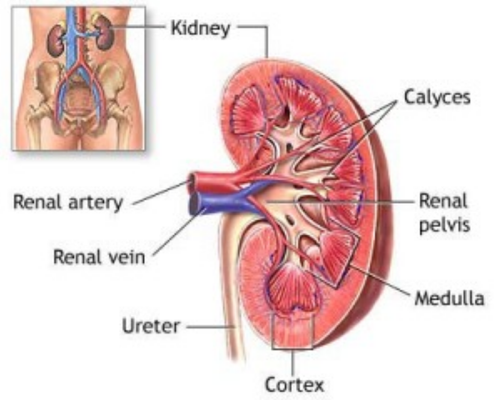March is National Kidney Month
National Kidney Month was started to bring awareness to kidney disease. Often times people don’t know they have kidney disease until their kidneys are damaged so it is important to know if you should be tested.
What Do Kidneys Do?
Your kidneys are located in the middle of your back, just below your ribcage. The main function of the kidneys is to filter extra water and wastes from your blood to make urine. The second job your kidneys do is to balance minerals like: calcium, phosphorus, sodium and potassium that circulate in the blood. Your kidneys also make hormones that control blood pressure, make red blood cells, and keep your bones strong.
When a person had Chronic Kidney Disease (CKD), their kidneys are not able to filter the blood as they should because they are damaged. This damage causes wastes to build in your blood and cause other problems. If your kidneys stop working, known as kidney failure, you will have to rely on dialysis to clean your blood and you may need to have a kidney transplant.
Basic Facts About Kidney Disease
- CKD affects more than 30 million adults in the United States.
- People in the early stages of kidney disease may experience zero symptoms.
- African Americans, Latinos and First Nations People, who have a higher rate of diabetes and high blood pressure, tend to be at a greater risk of having CKD.
Who Should Get Tested for CKD
People who have diabetes are at a greater risk of having CKD because high blood sugar damages the filters in your kidneys. People that have high blood pressure are at risk of having CKD because high blood pressure damages the blood vessels in the kidneys. There is a relationship between heart disease and kidney disease; people with heart disease have a much higher chance at having kidney disease and visa versa. CKD runs in families too. If your parents or siblings have CKD you should get your kidneys checked and encourage other family members to get tested as well.
Other causes of CKD are:
- Diseases and Genetic Conditions that attack the kidneys
- Infections
- Drugs that are toxic to the kidneys
- Lupus and other disease that affect the entire body
- Heavy Metal Poisoning
The chance if kidney disease increases with age, especially if you have diabetes, high blood pressure or heart disease. If you have kidney disease and it is caught early enough, you might be able to avoid or at least delay serious health problems.
Questions You Should Ask Your Doctor
- What is my glomerular filtration rate (GFR)?
- What is my urine albumin result?
- What is my blood pressure?
- What is my blood glucose?
- Am I at a healthy weight?
- Do I need to meet with a dietician for help with meal planning?
- Have I been tested for kidney disease?
- How healthy are my kidneys?
- How often should I get my kidneys checked?
- What should I do to keep my kidneys healthy?
- Do I need to be taking different medications?
- Am I being physically active enough?
- What kinds of physical activities can I safely do?
- What happens if I have kidney disease?
Symptoms of CKD
Our kidneys are made so well people can live with only one working kidney. Even with damage, kidneys can work well which is why people don’t often know they have CKD until there is a lot of permanent damage. As a person’s kidneys become less able to do their job, they might experience edema or swelling in the legs, feet, ankles and sometimes in the face and hands because their body is less able to process all the fluids.
A person with advanced CKD may experience:
- chest pain
- dry skin
- itching or numbness
- feeling tired
- headaches
- increased or decreased urination
- loss of appetite
- muscle cramps
- nausea
- shortness of breath
- sleep problems
- trouble concentrating
- vomiting
- weight loss
Anemia, bone disease and malnutrition can also develop in people with Chronic Kidney Disease. CKD can also lead to heart disease, stroke or heart attack.
A person with CKD can still lead an active and productive life with proper care. Changing your diet and adopting a Wellness Lifestyle will help you keep your kidneys healthy. If you have diabetes or high blood pressure, see your doctor about how to manage your blood glucose and blood pressure. CKD is a progressive disease. The scars caused by kidney damage are permanent so creating a Wellness Plan is very important
Preventing Kidney Damage
As I mentioned before, if you have diabetes, high blood pressure or heart disease it is vital that you do what you can to get your numbers under control. Your doctor will prescribe appropriate prescriptions but the rest is up to you.
Diet is very important to maintaining a health body. Healthy food choices include fresh fruits, fresh or frozen vegetables, whole grains and low-fat or fat free dairy products. It is important to reduce salt and added sugars from your diet.
Tips for Healthy Food Goals:
- Learn to cook with spices instead of salt
- When you eat pizza, choose vegetable toppings
- Instead of frying try baking or broiling meat, chicken and fish
- Serve foods without gravies and added fats
- Choose foods that have little or no added sugar
- Gradually work your way down to low fat milk products
- Eat foods with whole grains, choose brown or wild rice over white
- Read food labels and choose foods low in saturated fat, trans fat, cholesterol, salt or sodium and added sugars
- Eat slow and pick foods that take longer to eat: eat popcorn instead of cake or peel and eat an orange instead of drinking orange juice
- Keep a food journal so you can recognize bad eating habits and work toward learning more positive eating habits
Movement is key to health. Being active for at least 30 minutes or more every day is a good goal. If you need help with motivation or proper exercises for your fitness level consider a personal trainer. Talk to your doctor before implementing changes to your exercise routine (or starting one) so they can help you make good choices for your health.
My doctor is always happy to see how my numbers are improving. At one time I was unable to do more than a few minutes of exercise without fibromyalgia and arthritis flares but I was diligent to learn how to utilize strength and endurance training instead of aerobic exercise. I began small, with a low goal of reps and time for my workouts and now I can maintain a 45 to 55 minute workout, which is more stretching than cardio, every day without flares, and I have more flexibility and endurance…and all my numbers are better and I have reduced several medications.
Aim for a healthy weight if you are over or under weight. Your doctor can refer you to a dietician or physical therapist if they feel that is necessary. A good personal trainer can also help you create a Comprehensive Wellness Plan with proper goals according to your personal needs.
Sleep is so important to everyone’s overall health. The goal should be 7 to 8 hours of sleep per night. Good sleep hygiene will help you reach your goals. It is important to make sleep a priority and create a sleep routine.
Quit Smoking. If you smoke or use tobacco products, quit. If you need help call 1-800-784-8669 or go to SmokeFree.gov.
Limit Alcohol Intake or quit drinking altogether. Drinking alcohol is just added calories and bad carbs which can lead to weight gain and raise your blood sugar and blood pressure. If you don’t choose to quit drinking, at least limit yourself. One serving of beer is 12 oz. One serving of wine is 5 oz. One serving of liquor is 1.5 oz. Woman can have 1 drink per day and men can have 2.
Reduce stress by finding activities that help you relax. Physical activities and meditation are great ways to reduce stress on your body. Engaging in a hobby is another way to relax: Gardening, wood working and fishing are all great examples of hobbies that might bring your joy and satisfaction.
Maintain your health by taking necessary medications and supplements, managing any chronic illnesses like diabetes, high blood pressure, high cholesterol and other illness that is stressful to your body.
Also make sure that if you think you have a urinary tract infection, you get to the doctor right away. An untreated UTI can cause kidney damage.
The last time I had a UTI, my doctor prescribed an ultrasound for my kidneys because I had high levels of Ketones in my body. She was not happy I was taking ketone supplements and wanted to make sure I wasn’t hurting myself. Although, all my tests came back with good results, I did eventually stop taking ketones because, for me, they weren’t causing the results I was looking for; also my mother and aunt frequently have issues with their kidneys and I decided my doctor’s worries were worth considering.
It is important to have regular check ups with your medical team in order to make sure your body is working well. Prevention is the best way to maintain your health. Wellness Works NW would like to encourage you to take care of yourself because you are important: there is no one that can take your place.
I hope this article answered questions you had and was easy to understand. If you would like us to write about a particular topic that you can’t find on this site, please send us an email on our Dear Jamie page and someone from Our Team will be glad to research and write about your topic.
Resources and Start Learning More:
- Cause of Chronic Kidney Disease by National Institute of Diabetes and Digestive and Kidney Diseases Staff
- National Kidney Month by National Institute of Diabetes and Digestive and Kidney Diseases Staff
- Preventing Chronic Kidney Disease by National Institute of Diabetes and Digestive and Kidney Diseases Staff
- What is Chronic Kidney Disease? by National Institute of Diabetes and Digestive and Kidney Diseases Staff
Related Articles
- Oh no! Glutened! Now what?
- Fat Cells 300: Washing Fat Cells
- Fat Cells 200: How Our Bodies Use Fat
- Learning About Vitamin D
- Knowing When to Detox or Not To Detox…
I hope this article helps Fuel Your Wellness. Please leave your comments below.
~
~
 Summer D Clemenson co-owns Clemenson Enterprises and Wellness Works NW with her wife, Karen G Clemenson. Their personal motto is Creativity, Honesty & Positivity are a must! This mantra helps them stay community and wellness minded in all they do. Summer also writes poetry and inspirational blogs @ ClemensonEnterprises.com. Her crochet art can be viewed and purchased @ KnottyWares.com & she loves special orders!
Summer D Clemenson co-owns Clemenson Enterprises and Wellness Works NW with her wife, Karen G Clemenson. Their personal motto is Creativity, Honesty & Positivity are a must! This mantra helps them stay community and wellness minded in all they do. Summer also writes poetry and inspirational blogs @ ClemensonEnterprises.com. Her crochet art can be viewed and purchased @ KnottyWares.com & she loves special orders!













